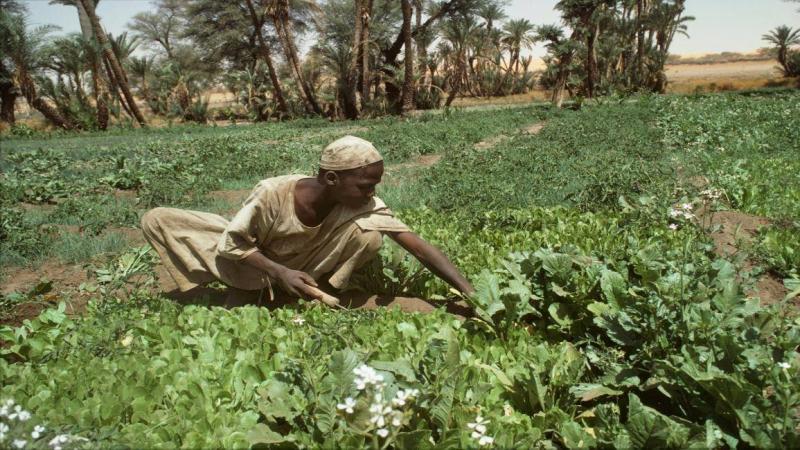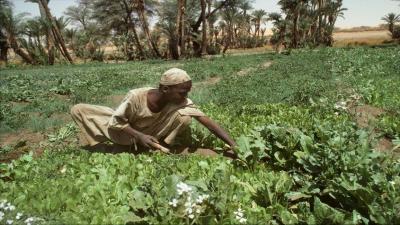Farmers in several Sudanese states have confirmed that the war between the army and the Rapid Support Forces has put this year's production of staple crops at risk, threatening to exacerbate hunger and poverty in the African nation.
Reuters spoke to over ten individuals, including farmers, experts, and relief workers, who reported delays in planting crops such as sorghum and millet, due to causes including a lack of bank lending and rising prices of fertilizers, seeds, and fuel. Four farmers interviewed by Reuters said they might not be able to plant at all before the anticipated heavy rains this month, which is the traditional irrigation opportunity.
The deteriorating conditions for farmers suggest that a hunger crisis is imminent, potentially more severe than what the United Nations and relief workers anticipate. In May, the UN indicated that its estimates suggested the number of hungry people in Sudan would rise to 19.1 million by August, up from 16.2 million before the conflict began in April.
The shortage of essential food items, compounded by looting of warehouses in cities like the capital Khartoum, is likely to intensify a hunger crisis that has been worsening for years. This will also limit means of livelihood and strip Sudan of the foreign currency needed to import essential goods, as central bank figures indicate that high-value commercial crops like sesame and peanuts contributed $1.6 billion in export revenues in 2022.
According to the Food and Agriculture Organization (FAO), nearly 65% of Sudan's population of 49 million works in the agricultural sector. While UN experts state that it is too early to officially declare a famine in Sudan, four farmers told Reuters they believe the situation is already heading in that direction.
Abdul Raouf Omar, a farmer and leader in a farmers' alliance in Al-Jazirah state, a key agricultural area in central Sudan that has not witnessed fighting, said: "Peanuts should have been planted. People should have started planting sorghum. So far, our readiness is zero. We believe we are threatened by famine."
Omar fears that the planting time may already have passed, a view shared by three other farmers. A major issue is a lack of financing and failure to deliver on lending promises or in-kind support from banks. Last week, the FAO reported that it had begun emergency distribution of sorghum, millet, peanuts, and sesame seeds, and hopes to face "complex security and logistical challenges" to provide enough to cover the needs of between 13 and 19 million people.
The World Food Programme (WFP) noted it will continue to analyze the situation over the next six months, following the planting and harvest season. Banks have been looted and forced to reduce operations as fighting erupted between the Sudanese army and the Rapid Support Forces, a large paramilitary group, on April 15 in the capital Khartoum.
Farmers in other parts of Sudan are facing a similar plight. Mohamed Ajab Sadiq, a farmer in the Sinnar, Blue Nile, and White Nile states, reported difficulties in obtaining financing for inputs to cultivate about 10,000 acres of sorghum, sesame, and sunflowers. He typically relied on proceeds from selling the previous season's crops, but the conflict has made this nearly impossible, as the market is centralized in Khartoum.
In May, the Sudanese cabinet issued directives to continue preparations for the summer agricultural season and remove obstacles that might hinder the process. This includes identifying target areas for the summer season and devising a plan to supply the necessary agricultural inputs.
Sadiq, like other farmers, was promised seeds and fuel from the state-linked agricultural bank, but by early this month he was still waiting. He mentioned there is a significant chance he will not receive this support, adding: "Personally, there's a 60-70% chance I will halt agricultural activities. It's a major risk, not a minor one."
Farmers who could secure financing reported a sharp increase in input prices, including seeds, fertilizers, pesticides, and fuel, according to what four farmers and the World Food Programme noted. Mahdi Ahmed, a farmer in North Kordofan, stated: "Fuel is being sold on the black market, and prices have increased 300%. Unfortunately, all of this indicates the failure of the agricultural season."
In regions of western Sudan, where relief groups report dwindling food supplies, Ahmed and another farmer, Mohamed Abdullah from North Darfur, indicated that farmers have faced looting and theft at the hands of gangs, including soldiers from the Rapid Support Forces, while trying to access their fields.
The FAO representative in Sudan, Adam Yao, mentioned reports of delays in larger commercial farms producing for export, as well as producing sorghum and millet. He said: "Any disruption will have a massive impact on the economy of the country and on the livelihoods of the Sudanese people."
According to three sources in the sector, food and raw material imports have been negatively affected by the war and financial collapse. Fighting, looting, and bureaucratic restrictions have limited the access of humanitarian aid. Both sides have been accused by relief agencies of obstructing the delivery of aid, including food. Both parties have publicly stated they have facilitated relief efforts while exchanging accusations of hindrance.
In Al-Jazirah state, which has received more than 169,000 internally displaced people fleeing from the fighting in Khartoum, some food items have been reported as scarce, with the World Food Programme providing support there for the first time.
Leni Kinsley, the World Food Programme's communications officer in Sudan, stated: "This increases the pressure on basic resources in that area." The Islamic Relief Organization points out that some farmers have resorted to consuming some of their stocks of sorghum and millet seeds, further reducing the amounts available for planting as conditions deteriorate, especially in Darfur, Kordofan, White Nile, and Sinnar.
Those remaining in Khartoum face shortages in supplies and rising prices, with liquidity running dry, while looting, store closures, and supply chain issues negatively affect availability. Two residents told Reuters that all bakeries in the neighborhoods where they live have closed.
Imad Adly from the Emergency Room of Omdurman, a volunteer group, said that the price of a loaf has jumped by over 130% to 70 Sudanese pounds (0.12 USD). Razan Bahaa, who lives in Bahri, indicated that the price of a loaf in her area has quadrupled to reach 200 pounds (0.33 USD).




